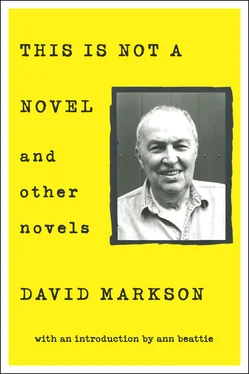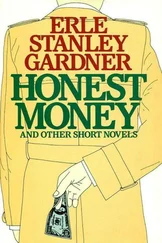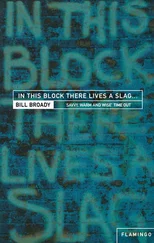David Markson
This is Not a Novel and Other Novels
Introductions, when read at all, might sometimes be considered as an afterthought to the reader’s own impressions after finishing the book. There’s nothing wrong with guarding one’s capacity for surprise when encountering the work of an author who’s new to you, nothing wrong with reading the review after seeing the movie. So, perhaps perversely, I hope you’ll read these three novels and form your own impression, and if my remarks suggest other things, or verify or call into question certain feelings, they’re only that: an appreciative reader’s observations.
But they’re fond remarks. What I have to say teeters between David’s having been my friend, and my awe and continued amazement at his work and what he achieved. Since now there will be no new work, I can only re-read — which might elicit the same responses, because of familiarity. Yet every time I pick up one of his books, I find it more exceptional than it seemed at first. I’m not alone in this response: it’s appreciated and discussed and is often spoken of as representing a leap forward for American literature. I’m still troubled that it wasn’t more appreciated in his lifetime, but I’m less sure that matters — except, obviously, for a writer being able to make a living, and for reinforcing the writer’s sense of self esteem, which are not minor matters. “Rediscoveries” are more and more a part of literary culture: Edith Pearlman; the re-issues in the wonderful New York Review of Books Classics series (don’t miss The Pilgrim Hawk by Glenway Wescott, if The Great Gatsby initially gave you snow blindness). We’ve always had Counterpoint to thank for bringing forth unexpected texts, radical books for acute readers. That doesn’t mean that you have to be an expert to enjoy them.
I knew David in the early eighties in New York. He lived in Greenwich Village, I lived in Chelsea. We had a few mutual friends. When we were introduced, I hadn’t read his work, but I did know that Douglas Day, who’d also written about Malcolm Lowry, had the greatest respect for David’s Lowry book. I eventually read a couple of David’s early books, liked them but wasn’t over the moon, and as we got to know each other a bit better, he asked if I’d read a manuscript he was finishing called Wittgenstein’s Mistress . As I write, four extra copies are on my bookshelf, in case someone wants to read it. I took the manuscript home with me and read all night. I was speechless. Whatever I did finally manage to say on the phone no doubt let him know how astonished I was at what he’d done. In the back of my mind, I had feared reading a manuscript that would call on my nonexistent knowledge of Wittgenstein. And, as writers always fear, if they don’t like what they read, they have to figure out how honest to be in their response. I’m sure I fell all over myself, but he did understand that I thought it was one of the most moving, surprising books I’d ever read. And I’m sticking to that. The character in that novel is either the last person on Earth, or she believes she is. Absence throbs in the text. The last page is heartbreaking. And while that earlier book is quite distinct from these three, the idea of a solitary thinker, an artist (she is a painter) without reinforcement, but with many memories and confusions, going toward she knows not what, provides a kind of thematic undertow that This is Not a Novel, Vanishing Point , and The Last Novel crest above.
There is no possibility David Markson would have thought of being fashionable. But without any calculation, David’s writing has come to be considered very of-the-moment. I bring this up because for readers who’ve heard of him only recently, perhaps in on-line magazines or various blogs and literary sites, or because his books have been embraced in the academic world, his categorization as “postmodern” might come to mind. I can’t argue with that, though of course it was not the categorization that led David Foster Wallace to write him a fan letter. For Wallace, as for many other writers, it was for his unique mining of a territory that didn’t much exist — at least in the United States — until David asserted its presence. First he discovered the turf. Then he stood on it.
You have in front of you his last three books, which have often been addressed in terms of collage. We, in these fragmented times, with our reputed short attention spans and our belief that with enough intellectual coaxing anything can be made to fit with everything, react positively to “collage.” People love to compare writing to visual art, though I don’t think his work has much to do with collage. What I think is that he was his own perfect team of Eliot and Pound, a poet who displaced and projected emotions onto an opaque, little-peopled landscape that, after being re-arranged and judiciously edited, revealed the bones of a skeleton we knew existed, though not in this exact, surprising form. So, okay: I’d have it that he was a brilliant paleontologist as well as a fiction writer with the deft touch of a poet. Teamed with himself, he was absolutely brilliant. He really shuffled those cards: a quote from Diogenes; a little-known fact about Baudelaire (“Baudelaire wore rouge”). (They really were cards; his notes were kept on index cards. Many, many.) So in some ways he was a collector, and metaphorically speaking I suppose he had to eventually glue his sentences down in what he considered the best possible order. But they are all words , the images conjured up, but off the page, the collage — if it’s even an appropriate comparison — assembled horizontally, for the eye to scan from left to right.
Try to stop reading one of these three novels. Meanings accrue; mysteries arise; you laugh when you least expect to laugh; a character (or characters) are indelibly created (though in the Beckettian manner, he uses as few as possible). It’s often observed that when you compile a list, what is revealed transcends the individual notations. Write a play — in which you are primarily restricted to dialogue — and the problem is often that the dialogue takes on too much meaning. A writer as aware and purposeful as David would have been highly sensitized to that. By the time he finished, he knew what the books were. And then, I’d guess, he went on to write a second book in the same manner, because he also knew what the books were not. I’m not the one to say how many books by a writer are enough, too few, or too many. They’d have to all exist, to have a dialogue. There would have had to be many more in this series (how I wish they existed; he was working on another when he died) to know if they’d stretch all the way to the distant horizon line that existed, way in the distance, sometimes obscured by fog, as a definition of what the twentieth century was. He, himself, worried about doing the same old thing — but any serious writer becomes inhibited and nervous about that. He was a man of habits, of increasingly small geographical parameters (hey: he got old and wasn’t in perfect health. Also, his beloved Strand was nearby). But he read assiduously (who cares if he didn’t keep up with contemporary fiction? Even his own admission of deficiency seems half-hearted), and developed his book’s trajectories subtly but deliberately, working both on the level of the sentence and keeping in mind the book’s arc. Some sentences are inverted; many present the observation or statement, then fill us in on who said it (“He who writes for fools will always find a large audience/said Schopenhauer”). And then, when we are used to this system of presentation, he drops in a simple declarative sentence (“Marco Polo died three years after Dante”). Among the questions David implies is this: Does it matter who said what, or that the thing was said? For me, what’s stated, usually tersely, is like a balloon whose string dangles the name of the person being quoted. Interesting questions are raised: of the spoken word vs. the personality of the speaker; how one statement inadvertently continues or calls into question another. And throughout, a fictional persona co-exists with these usually famous artists and philosophers and musicians — a bare-bones sort of person sunk sometimes in a self-pity that seems simultaneously funny, or wandering alone through a maze of concepts that do and don’t have anything to do with his banal day, his banal (but human/therefore human) desires. What we have is fiction, comprised of fact and hearsay and words already written, whether transcribed exactly or not, repeated by David in a different order, appropriated for the purpose of making a new creature sent out to join up with those who already exist.
Читать дальше












